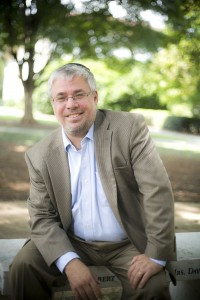CSUN Lecture to Explore the Impact Ethiopian Immigration has on Israel
What does it mean to be Jewish? And what roles do race and nationality play in determining who gets to immigrate to Israel, particularly when those asking to immigrate are Ethiopian?

Don Seeman
Those questions and more will be explored at California State University, Northridge’s third-annual Maurice Amado Foundation Lecture in Jewish Ethics on Wednesday, March 9. The lecture “The Ethics of Ingathering: Race, Religion and the Dilemmas of Ethiopian Immigration to Israel” by Don Seeman, author of “One People, One Blood: Ethiopian-Israelis and the Return to Judaism,” is scheduled to take place at 7:30 p.m. at Valley Beth Shalom, located at 15739 Ventura Blvd. in Encino.
“Don Seeman was invited to give this lecture because his anthropological work offers a compelling way to talk about ethical questions,” said Jennifer Thompson, CSUN’s Maurice Amado Assistant Professor of Applied Jewish Ethics and Civic Engagement. “Because he has spent many years doing fieldwork among Ethiopian-Israelis, he has a deep understanding of, as he might say, ‘what’s at stake’ for them, as well as for the Israeli society into which they are integrating.
“Those attending the lecture will have the opportunity to think about ethical questions about immigration from different perspectives,” she continued. “I hope that they will come away appreciating that there are often no simple answers to ethical questions, while also thinking that it is nevertheless worth the effort to explore and do the best we can to resolve those ethical questions.”
Seeman is an associate professor in the Department of Religion and the Tam Institute for Jewish Studies at Emory University in Atlanta. He is widely published in the areas of Jewish thought and social anthropology of modern Israel. He is the co-editor of “Contemporary Anthropology of Religion,” a book series at Palgrave Macmillan.
Seeman explained that most Ethiopian immigrants to Israel since 1991 descend from people whose ancestors had either assimilated or converted to Christianity, unlike earlier Beta Israel Ethiopian immigrants. This group’s immigration has raised difficult ethical, cultural and legal controversies in Israel around such topics as the limits of “Jewish solidarity” and the “Jewishness” of the new immigrants. Seeman has written the only scholarly account of this immigration and its aftermath.
The Amado lectures are part of the mission of CSUN’s Jewish Studies Interdisciplinary Program’s endowed professorship, which was created with the understanding that whomever holds the position would teach and engage in scholarship drawn from the heritage of Sephardic, Ashkenazic and other Jewish traditions. The lectures “extend the work that I do in Jewish ethics by bringing other experts in as well,” said Thompson.
CSUN offers a major and a minor in modern Jewish studies. The program explores the rich heritage of the Jewish people. Using the methodologies of different academic disciplines, it examines the experiences of Jews in the many lands in which they have lived over the past 4,000 years, as well as contemporary Jewish life in Israel, Europe, Asia and the Americas.
The lecture is free and open to the public, but seating is limited. For more information or to RSVP, email jewish.studies@csun.edu or call 818-677-4724.

 experience
experience